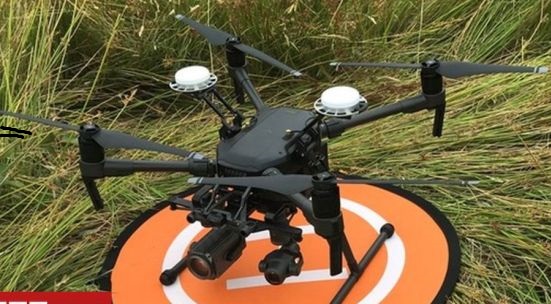Experts gather at NIGAV seminar to focus on risks posed by drones at airports
THE President of the Nigerian Unmanned Systems and Robotics Association (NUSA), Air Vice Marshal Olufemi Idowu (Retired) promised that the body would continue to liaise with the competent Nigerian licensing authorities to ensure that safety is not compromised when using drones.
Several are of the view that proper legislation and regulations regarding the use of unmanned aerial vehicles (UAVs) are a step in the right direction for aviation accident investigation
Drones can be the source of whining in the aviation industry, with many causing flight delays and safety risks. But what about the vast potential of drones to provide assistance and even improve safety? Here's a look at how drones could help rather than hinder airports.
The Nigerian Civil Aviation Authority (NCAA), while acknowledging that flying a drone is legal in Nigeria, however, stressed the need to be aware of the regulations for full compliance before s dive into it.
The use of drones is described as a significant hazard In an airport, for example when a drone is sucked into a jet engine, the metal or plastic device with high capacity batteries has the potential to cause much more damage than that created by a bird strike.
While it has been recognized that a drone coming into contact with a fast moving aircraft can cause damage to the body of the aircraft or the windshield, to prevent any such incident, airports are now shutting down drones. flights when a drone is seen, which was responsible for the closure of Gatwick Airport in December 2018.
Speaking at a Safety Seminar on “Safety and Risk Management for Unmanned Aircraft Operations” held at the NIGAV Center at Murtala Mohammad International Airport in Ikeja, Idowu, explained that the NUSA will ensure that interested or potential members are duly authorized by the NCAA in order to maintain security in the airspace while promoting the development of the private unmanned system.
"Today, NUSA, as part of its commitment to the safe and responsible use of unmanned aircraft in Nigeria, is hosting this seminar to better educate members on safety and risk management in air force operations. 'unmanned aircraft'
Idowu explained how the association has worked with a specific goal of reaching out to non-NUSA members, especially those unlicensed whose operations could pose a safety hazard to national airspace .
While pledging that NUSA will not encourage unauthorized operators to continue to provide security in the airspace, Idowude said, "We serve as a body of knowledge on systems without driver for government regulators as well as interested stakeholders and end users of unmanned systems, particularly remotely piloted aircraft systems"
In his remarks, Dronteck President and Seminar Host Mr. Fortune Idu described NUSA as an NGO duly recognized by the NCAA as an organization founded to foster, develop and promote unmanned vehicle systems and technologies. robotic technologies in the country. .
Idu said UAS and the autonomous vehicle industry continued to grow at an exponential rate as the country was being left behind, adding that the emerging industry remained a game-changer with huge potential to create jobs in software and hardware engineering while enabling other sectors to offer speed and efficiency.
Lamenting that drone entrepreneurship has continued to pose major security challenges around the world, Idu noted that the vertical control that stems from regulation and oversight has not been fully entrenched and harmonized with regular aviation or manned aircraft system and airspace was under development
"This is a very sensitive window that can lead to a disaster that should be a safety concern for all. As this industry continues to grow rapidly, so do the risks associated with operations dangerous,” he added.

THE President of the Nigerian Unmanned Systems and Robotics Association (NUSA), Air Vice Marshal Olufemi Idowu (Retired) promised that the body would continue to liaise with the competent Nigerian licensing authorities to ensure that safety is not compromised when using drones.
Several are of the view that proper legislation and regulations regarding the use of unmanned aerial vehicles (UAVs) are a step in the right direction for aviation accident investigation
Drones can be the source of whining in the aviation industry, with many causing flight delays and safety risks. But what about the vast potential of drones to provide assistance and even improve safety? Here's a look at how drones could help rather than hinder airports.
The Nigerian Civil Aviation Authority (NCAA), while acknowledging that flying a drone is legal in Nigeria, however, stressed the need to be aware of the regulations for full compliance before s dive into it.
The use of drones is described as a significant hazard In an airport, for example when a drone is sucked into a jet engine, the metal or plastic device with high capacity batteries has the potential to cause much more damage than that created by a bird strike.
While it has been recognized that a drone coming into contact with a fast moving aircraft can cause damage to the body of the aircraft or the windshield, to prevent any such incident, airports are now shutting down drones. flights when a drone is seen, which was responsible for the closure of Gatwick Airport in December 2018.
Speaking at a Safety Seminar on “Safety and Risk Management for Unmanned Aircraft Operations” held at the NIGAV Center at Murtala Mohammad International Airport in Ikeja, Idowu, explained that the NUSA will ensure that interested or potential members are duly authorized by the NCAA in order to maintain security in the airspace while promoting the development of the private unmanned system.
"Today, NUSA, as part of its commitment to the safe and responsible use of unmanned aircraft in Nigeria, is hosting this seminar to better educate members on safety and risk management in air force operations. 'unmanned aircraft'
Idowu explained how the association has worked with a specific goal of reaching out to non-NUSA members, especially those unlicensed whose operations could pose a safety hazard to national airspace .
While pledging that NUSA will not encourage unauthorized operators to continue to provide security in the airspace, Idowude said, "We serve as a body of knowledge on systems without driver for government regulators as well as interested stakeholders and end users of unmanned systems, particularly remotely piloted aircraft systems"
In his remarks, Dronteck President and Seminar Host Mr. Fortune Idu described NUSA as an NGO duly recognized by the NCAA as an organization founded to foster, develop and promote unmanned vehicle systems and technologies. robotic technologies in the country. .
Idu said UAS and the autonomous vehicle industry continued to grow at an exponential rate as the country was being left behind, adding that the emerging industry remained a game-changer with huge potential to create jobs in software and hardware engineering while enabling other sectors to offer speed and efficiency.
Lamenting that drone entrepreneurship has continued to pose major security challenges around the world, Idu noted that the vertical control that stems from regulation and oversight has not been fully entrenched and harmonized with regular aviation or manned aircraft system and airspace was under development
"This is a very sensitive window that can lead to a disaster that should be a safety concern for all. As this industry continues to grow rapidly, so do the risks associated with operations dangerous,” he added.
What's Your Reaction?






















